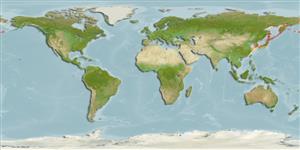Teleostei (teleosts) >
Osmeriformes (Freshwater smelts) >
Osmeridae (Smelts)
Etymology: Hypomesus: Greek, hypo = under + Greek,mesos = a half (Ref. 45335).
Environment: milieu / climate zone / depth range / distribution range
Ecology
Marine; freshwater; brackish; demersal; anadromous (Ref. 37812); depth range 0 - 50 m (Ref. 50550). Temperate
Northwest Pacific: Korean Peninsula and northern Japan to the Kuril Islands and Peter the Great Bay (Russia).
Length at first maturity / Size / Weight / Age
Maturity: Lm 9.0 range ? - ? cm
Max length : 25.0 cm TL male/unsexed; (Ref. 56527); max. published weight: 158.00 g (Ref. 56527); max. reported age: 8 years (Ref. 56527)
Dorsal spines (total): 0; Dorsal soft rays (total): 9 - 11; Anal spines: 0; Anal soft rays: 14 - 19; Vertebrae: 59 - 64. Vomer large, with broad, bifurcated posterior process; periphery of glossohyal bone with row of conical teeth, a few similar teeth located more centrally; pyloric caeca 6(4-7); base of adipose fin less than 20% of head length; eye small; adipose eyelid poorly developed.
A marine-coastal species; spawning occurs in May on beaches (Ref. 33312). Anadromous (Ref. 37812).
Spawn on beaches.
Saruwatari, T., J.A. López and T.W. Pietsch, 1997. A revision of the ormerid genus Hypomesus Gill (Teleostei: Salmoniformes), with a description of a new species from the southern Kuril Islands. Species Diversity 2:59-82. (Ref. 33312)
IUCN Red List Status (Ref. 130435: Version 2024-1)
Threat to humans
Harmless
Human uses
Tools
Special reports
Download XML
Internet sources
Estimates based on models
Preferred temperature (Ref.
123201): 2.3 - 19.4, mean 10.1 °C (based on 114 cells).
Phylogenetic diversity index (Ref.
82804): PD
50 = 0.5313 [Uniqueness, from 0.5 = low to 2.0 = high].
Bayesian length-weight: a=0.00372 (0.00178 - 0.00775), b=3.17 (2.99 - 3.35), in cm total length, based on LWR estimates for this (Sub)family-body shape (Ref.
93245).
Trophic level (Ref.
69278): 3.3 ±0.4 se; based on size and trophs of closest relatives
Resilience (Ref.
120179): High, minimum population doubling time less than 15 months (tm=1; tmax=4).
Fishing Vulnerability (Ref.
59153): Low vulnerability (15 of 100).
